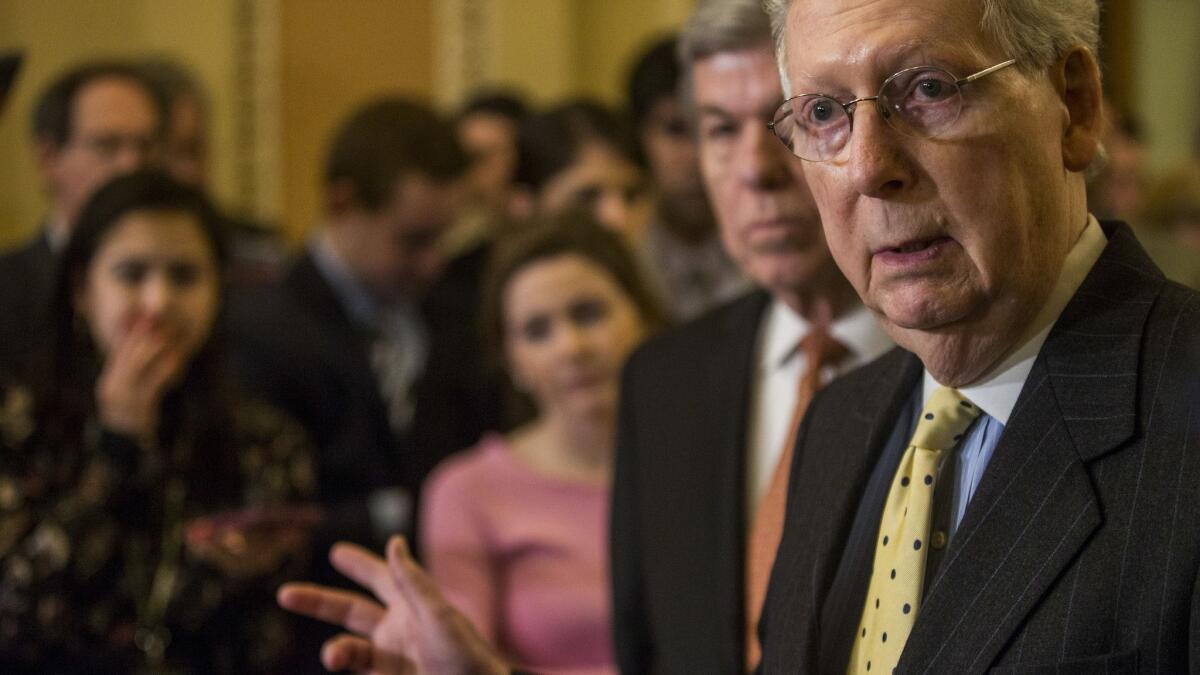Editorial: C’mon Congress, it’s time to lighten up on pot

If you weren’t already convinced that the blanket federal prohibition on marijuana is illogical, counterproductive and confusing, consider this: Despite the ban, all but three states have legalized some form of cannabis.
That creates a serious and obvious conflict. To address it, the federal government — under President Trump as well as President Obama — has for the most part opted not to enforce its own prohibition, so that marijuana growers and sellers in California and elsewhere are effectively permitted to violate federal law. At the same time, though, they can’t do business with most banks. Their legal status remains ambiguous. Medical research on marijuana is still stifled by restrictions. Tax collection is hindered. And the Department of Justice could change course and begin wide-scale prosecutions at any moment.
This is an untenable situation and an affront to the rule of law. For the second year in a row, a bipartisan group of lawmakers has proposed legislation in Congress that would address the problem by ending the federal prohibition in states that have chosen to permit medical or recreational marijuana under their own laws. As more and more voters choose to legalize pot products, it should be apparent that it is the federal law that is woefully out of date and out of step with public sentiment.
The only question is how much longer Congress can keep its head in the sand.
Democrats now control the House and are more amenable to moving legislation that would ease up on prohibition.
The legal conflict between the federal prohibition and the legalization movement in the states creates real problems. Most marijuana businesses can’t open bank accounts or accept credit card transactions because financial services companies refuse to serve them for fear of being penalized by federal regulators. That means marijuana transactions are typically done in cash, which is dangerous for employees and makes it harder to collect taxes.
Health officials are also hamstrung. Marijuana is classified as a Schedule 1 drug with no medicinal value and a high potential for abuse. The federal government’s strict limits make it hard for researchers to get access to cannabis for the kind of in-depth research necessary to understand both the benefits and dangers of marijuana use.
The bill in Congress, known as the States Act, would amend the Controlled Substances Act so that it would no longer be a crime for people to buy or sell marijuana, as long as they were following state laws. It also would extend the right to legalize marijuana to U.S. territories, federally recognized tribes and to Washington, D.C. (Voters there passed an initiative in 2014 to allow adult recreational use of marijuana, but Congress has blocked the district from permitting its sale.)
The lead sponsors of the bill are lawmakers from states that have legalized recreational and medical marijuana — including Sens. Elizabeth Warren (D-Mass.) and Cory Gardner (R-Colo.), and Reps. Earl Blumenauer (D-Ore.) and David Joyce (R-Ohio).
The bill was drafted last year after drug warrior and then-Atty. Gen. Jeff Sessions rescinded the Obama administration’s hands-off approach to states that had legalized marijuana. That raised concern that the Trump administration would start to prosecute businesses and people involved in the nascent legal market. Advocates, however, got a boost when President Trump said he “probably will end up supporting” the bill. Still, the proposal didn’t get very far.
Enter the Fray: First takes on the news of the minute »
This year could be different. Democrats now control the House and are more amenable to moving legislation that would ease up on prohibition. In fact, the House Financial Services Committee last week overwhelmingly advanced a bill that would let banks provide services to legal marijuana businesses without running afoul of federal law. It was the first time the House had ever held a hearing on the topic.
The States Act will have a hard climb in the Senate; Majority Leader Mitch McConnell (R-Ky.) has been wary of marijuana legislation. And Trump — whose words are often not backed by action — is not a reliable supporter.
Nevertheless, the bill appears to be the most promising effort to end the contradiction between state and federal law. That contradiction becomes more frustrating every year as more states, like California, vote to move marijuana sales out of the shadows into a regulated, controlled and taxed marketplace. The federal government should not continue to make it difficult for states to fulfill the will of the voters.
Follow the Opinion section on Twitter @latimesopinion and Facebook.
More to Read
A cure for the common opinion
Get thought-provoking perspectives with our weekly newsletter.
You may occasionally receive promotional content from the Los Angeles Times.










